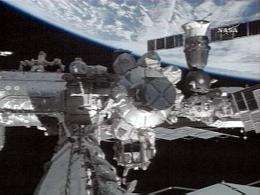Discovery, space station maneuver to dodge debris

Discovery and the International Space Station maneuvered to avoid debris during Monday's spacewalk, dropping into a lower orbit, NASA officials said.
Firing its steering jets, Discovery turned the shuttle and space station 180 degrees for three hours Sunday to increase drag, a maneuver designed to alter the vessel's trajectory and avoid an approaching piece of debris.
The ISS's altitude was lowered by 2 miles (3,3 kilometers) to about 223 miles (359 kilometers), explained Bill Jeffs, a spokesman at the Johnson Space Center in Houston, Texas.
"The time of closest approach was expected to be two hours into the EVA (extravehicular activity) Monday," he told AFP. Astronauts Richard Arnold and Joseph Acaba are scheduled to begin their spacewalk, the third and last of this mission, at 1543 GMT.
"Everything looks fine for the third EVA," Jeffs said.
The debris, which measures a little over 10 centimeters (4 inches), came from a Chinese rocket launched in 1999 that broke up in March 2000.
Elsewhere on the ISS, experts were working on a water-recycling unit that processes astronauts' urine and sweat into drinking water.
After working on the urine processing assembly Sunday and replacing a part, ISS Expedition 18 commander Michael Fincke "was successful at gearing the system up. The first sample was done," Jeffs said.
Several more samples will likely be completed during the mission, he added, so that Discovery crew can bring them back to Earth for analysis.
The machine, which was delivered to the ISS in November -- and has not yet functioned properly -- is key to double the orbiting station's crew from three to six and for long-term space expeditions such as moon landings or missions to Mars.
Carrying large amounts of water aboard the shuttle or other space vessels takes up room needed for other equipment and increases costs.
During their spacewalk, Arnold and Acaba will try to fix a jammed cargo platform after Acaba and Steve Swanson, another astronaut, on Saturday inadvertently inserted upside down a restraint pin used to clamp it to the outside the ISS.
Discovery's latest mission, which blasted off last Sunday from Florida with a crew of seven astronauts, is one of the last major efforts in a decade-long push by 16 countries to build the 100-billion-dollar outpost in space.
NASA has scheduled nine shuttle flights through 2010 to finish building the space station. Upcoming shuttle flights also include the last mission to service the orbiting Hubble telescope in May.
Discovery is due to land back on Earth on March 28 at 1742 GMT, two days after a Russian Soyuz mission takes off for the ISS carrying a crew of three, including US billionaire businessman Charles Simonyi, who has shelled out 35 million dollars for his second trip as a space tourist.
On Discovery, crew member Koichi Wakata became the first Japanese astronaut to join the ISS for a long stay. He is scheduled to remain on the orbiting station until June.
The Discovery mission, delayed five times, is the first by a US space shuttle in 2009.
(c) 2009 AFP

















